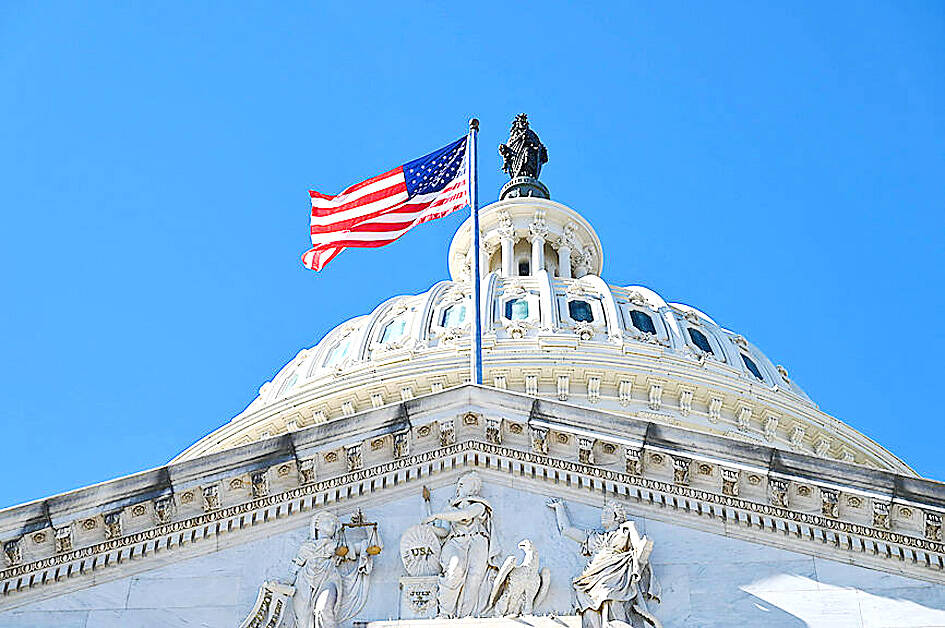The US House of Representatives on Friday approved an appropriations bill for fiscal year 2025 that includes US$500 million in military aid for Taiwan.
The legislation, which authorizes funding for the US Department of State, US foreign operations and related programs for next year, passed 212-200 in the Republican-led House.
The bill stipulates that the US would provide no less than US$500 million in foreign military financing for Taiwan to enhance deterrence across the Taiwan Strait, and offer Taipei up to US$2 billion in loans and loan guarantees for the same purpose.

Photo: AFP
The funding would be made available under the US’ Foreign Military Financing Program, which enables its partners to purchase US defense articles, services and training, according to the US Defense Security Cooperation Agency.
In addition, the US secretary of state, in coordination with the US secretary of defense, are required to prioritize the delivery of defense articles and services for Taiwan, the bill says.
The provisions are in line with the Taiwan Enhanced Resilience Act, which was consolidated into the 2023 National Defense Authorization Act.
Under the Taiwan Enhanced Resilience Act, the US would provide up to US$10 billion in foreign military financing for Taiwan over five years from last year to 2027.
Apart from military financing, the appropriations bill states that no funding should be used to “create, procure or display any map that inaccurately depicts the territory and social and economic system of Taiwan and the islands or island groups administered by Taiwan authorities.”
It also authorizes at least US$4 million in funding for the Global Cooperation and Training Framework — a cooperation initiative established by the US and Taiwan in 2015 — under the “Economic Support Fund.”
The State, Foreign Operations and Related Programs Appropriations Act provides a total discretionary allocation of US$51.7 billion, about 11 percent, or US$7.6 billion, less than the fiscal year 2024 enacted level, the US House Committee on Appropriations said in a news release.
Under the bill, the US would also allocate US$400 million to curb the influence of the People’s Republic of China (PRC) and entities acting on its behalf through the Countering PRC Influence Fund.
Following the House’s approval of the bill, the US Senate, in which the Democratic Party holds a majority, is expected to introduce and vote on its version of the bill.
After the Senate passes its version, the two chambers would need to work out the differences in their bills before submitting a finalized version for the president to sign into law.

CHAOS: Iranians took to the streets playing celebratory music after reports of Khamenei’s death on Saturday, while mourners also gathered in Tehran yesterday Iranian Supreme Leader Ayatollah Ali Khamenei was killed in a major attack on Iran launched by Israel and the US, throwing the future of the Islamic republic into doubt and raising the risk of regional instability. Iranian state television and the state-run IRNA news agency announced the 86-year-old’s death early yesterday. US President Donald Trump said it gave Iranians their “greatest chance” to “take back” their country. The announcements came after a joint US and Israeli aerial bombardment that targeted Iranian military and governmental sites. Trump said the “heavy and pinpoint bombing” would continue through the week or as long

TRUST: The KMT said it respected the US’ timing and considerations, and hoped it would continue to honor its commitments to helping Taiwan bolster its defenses and deterrence US President Donald Trump is delaying a multibillion-dollar arms sale to Taiwan to ensure his visit to Beijing is successful, a New York Times report said. The weapons sales package has stalled in the US Department of State, the report said, citing US officials it did not identify. The White House has told agencies not to push forward ahead of Trump’s meeting with Chinese President Xi Jinping (習近平), it said. The two last month held a phone call to discuss trade and geopolitical flashpoints ahead of the summit. Xi raised the Taiwan issue and urged the US to handle arms sales to

BIG SPENDERS: Foreign investors bought the most Taiwan equities since 2005, signaling confidence that an AI boom would continue to benefit chipmakers Taiwan Semiconductor Manufacturing Co’s (TSMC, 台積電) market capitalization swelled to US$2 trillion for the first time following a 4.25 percent rally in its American depositary receipts (ADR) overnight, putting the world’s biggest contract chipmaker sixth on the list of the world’s biggest companies by market capitalization, just behind Amazon.com Inc. The site CompaniesMarketcap.com ranked TSMC ahead of Saudi Aramco and Meta Platforms Inc. The Taiwanese company’s ADRs on Tuesday surged to US$385.75 on the New York Stock Exchange, as strong demand for artificial intelligence (AI) applications led to chip supply constraints and boost revenue growth to record-breaking levels. Each TSMC ADR represents

Pro-democracy media tycoon Jimmy Lai’s (黎智英) fraud conviction and prison sentence were yesterday overturned by a Hong Kong court, in a surprise legal decision that comes soon after Lai was jailed for 20 years on a separate national security charge. Judges Jeremy Poon (潘兆初), Anthea Pang (彭寶琴) and Derek Pang (彭偉昌) said in the judgement that they allowed the appeal from Lai, and another defendant in the case, to proceed, as a lower court judge had “erred.” “The Court of Appeal gave them leave to appeal against their conviction, allowed their appeals, quashed the convictions and set aside the sentences,” the judges